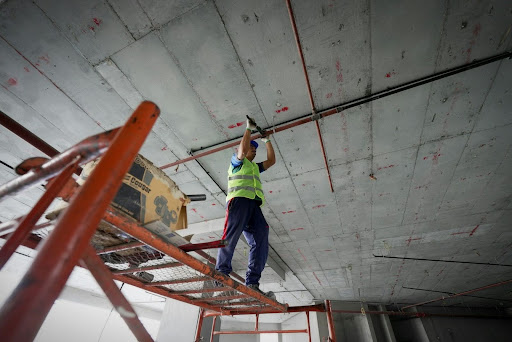
When building or renovating a home, it’s important to think about construction insurance for homeowners. One type of insurance that many people may not know about is warranty insurance. This insurance helps protect homeowners from problems that can happen after construction is completed. It ensures that if there are major issues with the building, the homeowner can get help without facing huge costs.
Warranty insurance usually covers things like structural defects and major repairs for a certain number of years. This gives homeowners peace of mind, knowing that they are protected if something goes wrong. In this blog, we will explore what warranty insurance is, how it works, and why it is an important part of construction insurance for homeowners. Understanding this insurance can help you make better choices when building or renovating your home.
What is Warranty Insurance in Home Building?
Warranty insurance, often referred to as home warranty insurance, is a specialised insurance product designed to provide cover for homeowners against financial loss resulting from defects in building work. This type of insurance generally applies to residential building work performed by licensed builders.
The core idea behind warranty insurance is to protect homeowners from potential risks associated with construction, ensuring that they are compensated for loss or damage due to substandard workmanship or materials. The warranty typically spans a designated period, often referred to as the period of insurance, during which homeowners can make claims for covered defects.
Homeowners need warranty insurance to secure their investments in home building or renovation projects. The construction industry can be unpredictable, and even the most reputable builders and tradies may occasionally deliver subpar work. Warranty insurance serves as a safety net, allowing homeowners to mitigate financial loss should issues arise post-construction.
Furthermore, it is often a legal requirement in many regions, including New South Wales, to have warranty insurance when engaging in residential building work. This not only protects the homeowner but also instils greater confidence in the construction process, knowing that there is a mechanism to address potential defects.
How Does Building Insurance Differ from Warranty Insurance?
Building insurance serves a different purpose compared to warranty insurance. While warranty insurance is focused on defects in construction work, building insurance provides cover for loss or damage to the physical structure of the home and its contents. This type of insurance typically covers risks such as fire, theft, and natural disasters, safeguarding the homeowner’s investment against unforeseen circumstances that may arise over time. Home and contents insurance is another layer of protection that can be purchased alongside building insurance to cover the contents within the home.
Many homeowners hold misconceptions about building insurance, particularly regarding its scope of coverage. One common misunderstanding is that building insurance covers all types of damage, including that caused by poor workmanship or design flaws. However, this is not the case; such issues fall under warranty insurance. Additionally, some homeowners believe that all builders automatically provide warranty insurance, but it’s essential to verify this and ensure that adequate coverage is in place before commencing any construction work.

When to Use Home Insurance vs. Warranty Insurance
Home insurance is activated in the event of damage or loss to the property caused by external factors, while warranty insurance is a safety net for structural and workmanship defects that may become apparent after the completion of construction. Homeowners must be aware of when to utilise each type of insurance.
For instance, if a storm causes damage to the roof, home insurance would come into play. However, if a homeowner discovers that the foundation has significant cracks due to poor construction, warranty insurance would be the appropriate coverage to address that issue.
What Does Home Warranty Insurance Cover?
Home warranty insurance typically covers a range of defects that may arise during the period of insurance. Common inclusions include structural defects, such as issues with the foundation, walls, and roof. It may also cover non-structural defects, including plumbing and electrical issues. Homeowners can usually expect warranty insurance to cover the costs associated with rectifying these defects, ensuring they are not left to bear the financial burden of repairs caused by the builder’s negligence.
While home warranty insurance provides extensive coverage, there are certain exclusions that homeowners should be aware of. For instance, damages resulting from normal wear and tear, improper maintenance, or natural disasters are generally not covered under warranty insurance. Additionally, if a homeowner undertakes unauthorised renovations or modifications to the property, this may void the warranty. Understanding these exclusions is vital for homeowners to avoid surprises when making a claim.
Every type of insurance has its limitations, and warranty insurance is no exception. Homeowners should be mindful of the coverage limits, which can vary based on the insurer and the specific policy. For instance, there may be caps on the amount that can be claimed for certain types of defects. Additionally, the terms and conditions attached to the insurance product will dictate the specifics of coverage, including the process for making a claim. Thus, it is essential for homeowners to thoroughly review their policy and understand what is included and what is not.

How to Make a Claim on Your Home Warranty Insurance?
To make a claim on your home warranty insurance, you start by documenting the defects, including taking photographs and gathering any relevant reports from qualified inspectors. It is also vital to review the terms and conditions of the warranty insurance to understand the specific requirements for making a claim. Homeowners must then formally notify their insurer and provide all necessary documentation to support their case.
Claims can be denied for several reasons, and it is essential for homeowners to be aware of these to avoid disappointment. Common reasons include failure to adhere to maintenance guidelines, reporting defects outside of the warranty period, or not providing sufficient evidence to substantiate the claim. Homeowners should carefully follow the claims process and ensure they meet all stipulations outlined in their warranty insurance to minimise the risk of denial.
The claims process for home warranty insurance can vary by insurer, but typically, it involves submitting a claim form and supporting documentation, followed by an assessment by the insurer. Be aware that processing times can differ, and it may take several weeks to receive a resolution.
Conclusion
Construction insurance for homeowners is very important for any home building or renovation project. It provides protection for both the homeowner and the contractor, ensuring that the project is completed to the highest standards and that any issues that arise are addressed promptly and efficiently. By considering construction insurance for homeowners and understanding the benefits of warranty insurance, homeowners can embark on their projects with confidence, knowing that their home and their investment are in good hands.
FAQs
The difference between public liability and professional indemnity lies in what they cover. Public liability insurance provides liability cover for injuries or damages to third parties caused by your business activities. In contrast, professional indemnity insurance covers claims related to professional advice or services that result in financial loss for clients. Understanding these differences is crucial for choosing the right type of insurance for your business.
You need professional indemnity insurance if your business provides advice or services that could lead to financial loss for clients. This type of insurance is designed to protect you from claims that arise from mistakes or negligence in your professional work. Without it, you could face significant costs from legal fees or compensation claims. It’s an essential part of business insurance for many professionals.
A professional indemnity insurance cover typically includes legal costs and compensation claims related to errors, omissions, or negligence in your professional services. This insurance protects your business from financial losses that clients may suffer due to your actions. It is crucial for professionals like consultants, accountants, and lawyers who provide specialised advice. Getting a quote for a professional indemnity insurance policy will help you understand the specific coverage options available.
The type of insurance you need for your business depends on the nature of your work. If you provide professional services, you may need professional indemnity insurance. If your business interacts with the public or involves physical products, public liability and products liability insurance are essential. Assessing your risks will help you determine which insurance products are necessary to cover your business adequately.
Public liability and professional indemnity insurance work together to provide comprehensive protection for your business. While public liability covers injuries or damages to third parties, professional indemnity protects against claims related to your professional services. Having both types of insurance ensures that you are covered for various risks associated with your business activities. This combination is often recommended for professionals who interact with clients and public relations.
Yes, you can get a quote for both public liability and professional indemnity insurance from many insurance providers. Many companies offer packages that include both types of insurance policies, allowing you to cover your business more effectively. When requesting a quote, be sure to provide details about your business activities to receive accurate coverage options. Comparing quotes will help you find the best insurance products for your needs.
Common claims covered by indemnity and public liability insurance include injuries to clients or third parties, property damage, and financial losses due to professional negligence. Public liability insurance covers claims related to accidents that occur on your business premises or due to your business activities. Professional indemnity insurance covers claims arising from errors or omissions in your professional services. Understanding these claims will help you assess your insurance needs.
Choosing between public liability vs professional indemnity insurance depends on your business activities. If your business involves providing professional services, you will likely need professional indemnity insurance. If your business interacts with the public or involves physical products, public liability insurance is essential. Evaluating the specific risks associated with your business will help you make the best decision regarding your insurance policies.
Public and products liability insurance protects businesses against liability claims arising from injuries or damages to third parties. While public liability insurance covers incidents involving the public, products liability insurance pertains to damages caused by products sold or supplied.





